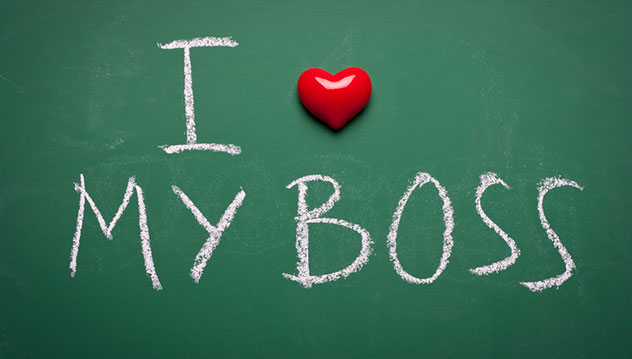One of the things I love most about October is the special day of celebration it brings us around this time each year.
I don’t mean Halloween.
The special day I’m referring to happens Thursday, October 16. On that day, in workplaces throughout Canada and around the world, workers will celebrate Boss’s Day, also known as National Boss Day, or Bosses Day.
The unofficial holiday was created in 1958 by Patricia Bays Haroski, a secretary who chose to commemorate the occasion on the birthday of her father, who also happened to be her boss at the State Farm Insurance Company.
The day got the seal of approval from Hallmark in 1979 with the introduction of Boss’s Day greeting cards. Now, according to Wikipedia, it is “a day for employees to thank their bosses for being kind and fair throughout the year.”
While some workers feel their boss is less than kind and fair, a majority of employees are impressed with their managers, according to a new OfficeTeam survey.
More than three in four workers interviewed said their boss has strong or very strong leadership skills. In addition, two-thirds believe they couldn’t do a better job than their manager.
“Although workers may not regularly praise their bosses, many look up to their managers’ leadership skills and acknowledge that supervisory roles can be highly demanding,” said Robert Hosking, executive director of OfficeTeam.
While the majority of workers apparently have a good boss, there is a sizable minority who don’t respect their bosses.
One in six workers rated their bosses’ leadership skills as not very strong, including 6% who said their bosses’ leadership skills are “not strong at all.”
In addition, 22% answered “Yes” to the question ““Do you think you could do a better job than your boss?”
While anyone with a bad boss may prefer to avoid the occasion of Boss’s Day, your bad boss may not understand if you decline to celebrate the day.
That’s because most truly bad bosses – like most truly bad singers on American Idol – think they are doing a great job!
It’s due to something known as the “Dunning-Kruger effect” which has been described in scientific terms as “a cognitive bias manifesting in unskilled individuals suffering from illusory superiority, mistakenly rating their ability much higher than is accurate.”
In a funny new video going around the Internet, comedian John Cleese describes the research in more basic terms. “If you’re very, very stupid, how can you possibly realize that you’re very, very stupid?” he asks.
Describing the research by his friend David Dunning of Cornell University’s Department of Psychology, Cleese explains: “If you’re absolutely no good at something at all then you lack exactly the skill to know that you’re absolutely no good at it.”
In their research, reported in their paper titled “Unskilled and Unaware of It: How Difficulties in Recognizing One’s Own Incompetence Lead to Inflated Self-Assessments”, Dunning and Kruger tested several hypotheses and found that incompetent people in a variety of situations:
- tend to overestimate their own level of skill
- fail to recognize genuine skill in others
- fail to recognize the extremity of their inadequacy
“Across many intellectual and social domains, it is the poorest performers who hold the least accurate assessments of their skill and performances, grossly overestimating how well their performances stack up against those of their peers,” wrote Joyce Ehrlinger and her co-authors in another paper titled “Why the Unskilled Are Unaware: Further Explorations of (Absent) Self-Insight Among the Incompetent”.
“For example, students performing in the bottom 25% among their peers on tests of grammar, logical reasoning, and humor tended to think that they are performing [in the top 40%].”
It’s no wonder bad bosses are often portrayed in the media as oblivious to their shortcomings. If you have ever watched The Office on TV or Netflix, you may have seen the “World’s Best Boss” mug used by the hilariously inept manager Michael Scott.
“Would I rather be feared or loved? Easy, both. I want people to be afraid of how much they love me,” said Scott in one episode.
You may not love your boss, but if you have a good one, consider yourself fortunate. And this Boss’s Day, let your good boss know that you appreciate him or her.
How to be a boss who deserves to be celebrated
Would you like a group of people to celebrate you next October 16? If you want to be a good boss, OfficeTeam offers five questions to consider when evaluating a move into management:
- Are you comfortable making difficult decisions? Managers must regularly make tough, time-sensitive choices, and the outcomes don’t always please everyone.
- Can you inspire others? The best leaders are passionate about what they do and motivate those around them.
- Are you a good listener? Being a strong communicator is one of the most valuable leadership skills, and listening to input from others is part of that equation.
- Do you mind taking the blame? When things go wrong, the boss is often the one held accountable.
- Are you OK stepping away from day-to-day activities? Taking on a leadership role can mean delegating projects to others and losing some hands-on experience.
Tag Goulet is co-founder of FabJob.com and Academic Director of the International Business and Management Career College which offers professional career and business certificates at www.ibmcc.com.

